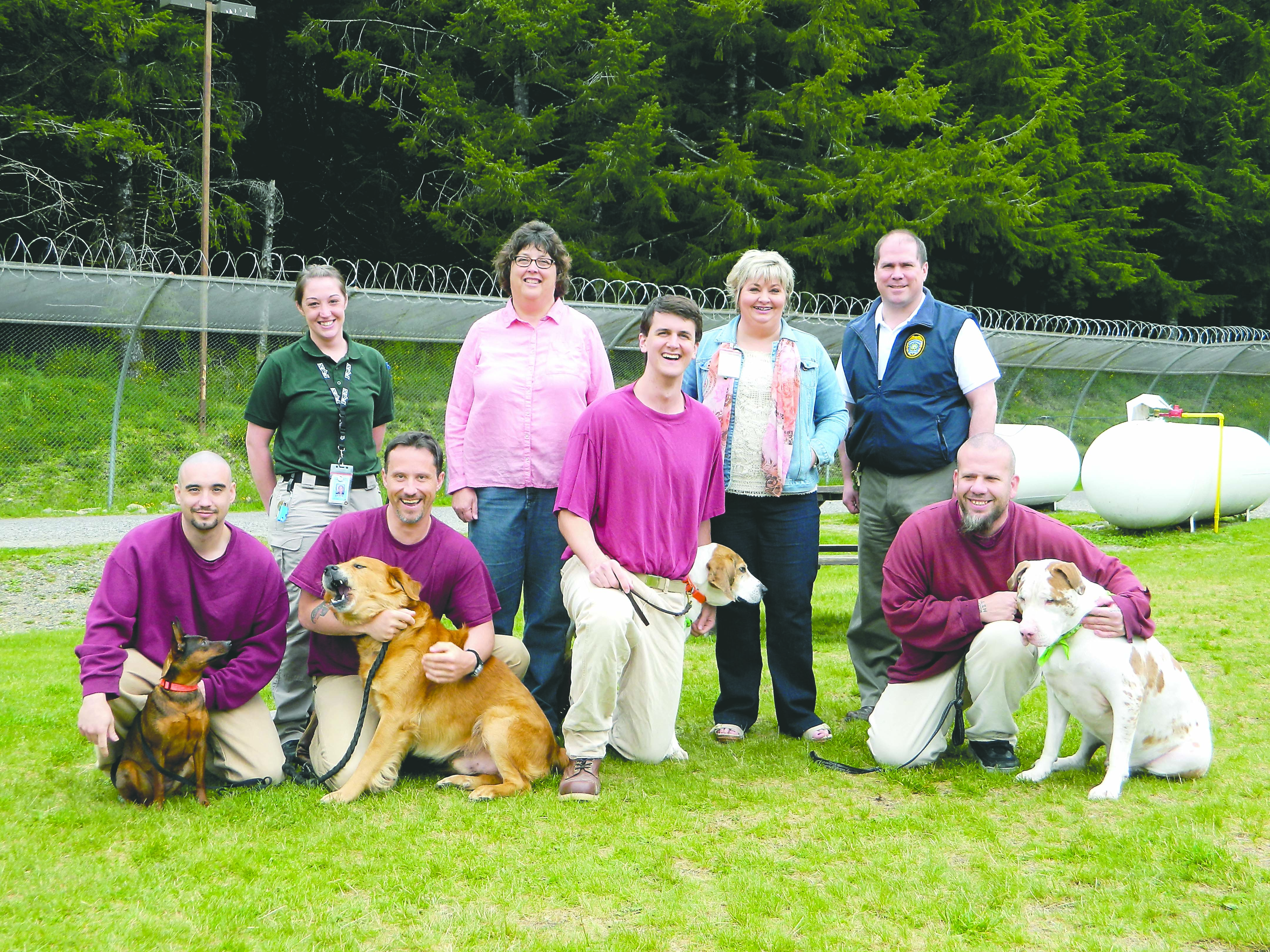FORKS — Though guilty of nothing, Cloudy found himself in prison south of Forks.
He was a pit bull mix taken to the animal shelter in Port Angeles when he was a pup of 6 months.
At over a year old, he was still awaiting a home, so he was shipped off to prison.
Since 2010, the Olympic Corrections Center and the Olympic Peninsula Humane Society have worked together to make dogs coming to the pound more adoptable.
The “dog program” began with a forceful push from Tracy Hixon, corrections officer, now retired.
The program enlists the assistance of offenders who give shelter dogs training to make them more appealing to prospective owners.
Canines leave the shelter for a term of six to eight weeks at the prison.
During that time, dogs are taught what is expected of them when living in a human environment.
Carol Hanson and Kaci Price of OCC drive to the Port Angeles shelter to choose dogs from nominations from the shelter staff.
The prison cannot take aggressive dogs since the facility is responsible for the safety of both the offenders living there and the staff working on site.
“Aggressive dogs will leave that very day,” said Jason Bennett, correctional program manager of OCC.
At the prison, dogs are introduced to a pair of offenders who are roommates as well as handlers.
In the care of these two men, the dogs learn commands per the guidelines set forth by the American Kennel Club’s Good Citizenship Program, though OCC is not affiliated with the club.
“Walking on a leash is vital and cannot be overemphasized,” explained Mary Beth Wegner, executive director of the Humane Society.
The dogs have 24-hour daily companionship, sleeping in crates next to the offenders’ bunks.
This constant attention pays off when correcting behaviors.
For example, Markswell the hound has a problem finding the correct place to relieve himself.
His handler, Taylor Marean, has learned to notice his “suspicious sniffing.”
This allows Marean to get the dog to the appropriate place so Markswell can receive praise for a job well done.
Cloudy went back to the Humane Society.
After several months, when he was still there, the staff at the Humane Society contacted OCC to see whether they could give him a break from his confines.
“Sometimes, OCC is like an overflow for the Humane Society,” Hanson said.
“We will get calls asking us to take a few off their hands.”
Bennett is quick to say that the Humane Society picks up the bill for the veterinary care and feed for the dogs housed at the prison.
One obligation the prison aims to fulfill for society is to release offenders who are able to be a useful part of their communities.
The dog program helps instill this in offenders by giving them responsibility on many different levels.
“This program gives us a way to give back a little bit,” Marean said.
“We have had 138 dogs complete the program and 134 dogs adopted.”
To qualify, an offender must have absolutely no history of animal cruelty, violent or sexual offenses.
Prospective handlers’ medical and mental health files are screened by trained staff.
Handling dogs is a privilege that can be lost through violations by the handler.
Travis Boyer passed all of the requirements and was introduced to Cloudy.
The dog program has grown from being a few dogs in one housing unit to dogs currently residing in all three units.
There may be 15 dogs and 30 handlers working the program at any given time.
“It seems like everybody wants to be a handler,” said handler Chris Hansford, hanging onto the leash of Buddy, a golden retriever.
Hanson and Price describe the offenders as “temporary guardians,” noting that the men take pride in the work they do.
Sometimes, the men write open letters telling the future owner the dog’s particular likes and unique attributes they have noticed.
OCC staff notice changes in the units when dogs are introduced.
“There is a sense of calm. The tone in the unit changes instantly,” Hanson said.
The lines between different residents are broken down because, as offenders get to know the various dogs, they also come to know the different handlers.
“The dogs help us develop relationships with each other,” said Travis Jackson, the handler watching over Copper, a mini-pincer mix.
Victory for the dog and the program is adoption.
Cloudy found a home, and Boyer is still helping dogs learn to be better citizens.
________
Zorina Barker lives in the Sol Duc Valley with her husband, a logger, and two children she home-schools.
